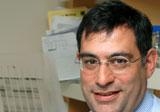Closing in on our number one killer
UNSW researchers have revealed new insights about Australia's number one killer - cardiovascular disease.
UNSW researchers have revealed new insights about Australia's number one killer - cardiovascular disease.

UNSW researchers have revealed new insights about Australia's number one killer - cardiovascular disease.
The findings, published in the high impact journal Circulation Research, could be used as possible drug targets for the disease in the future.
The research centres on a particular molecule, known as a transcription factor, which switches genes on and off.
"This is about the oldest known transcription factor, Sp1, which was thought to play a quiet, reclusive role in our blood vessels," said the senior author on the paper, Professor Levon Khachigian, from the Centre for Vascular Research.
"Our research has found that Sp1 undergoes a sudden chemical reaction that can lead to a heart attack," he said.
The same chemical reaction is involved in arteries after balloon angioplasty, a common procedure that leads to artery narrowing.
"If this change in Sp1 is targeted correctly, this would open up new ways to treat patients with cardiovascular disease, our biggest killer," said Professor Khachigian.
The co-authors of the research are Nicole Tan, Valerie Midgley, Mary Favurma, Fernando Santiago, Roger Fahmy, Michael Berndt and Mark Molloy.